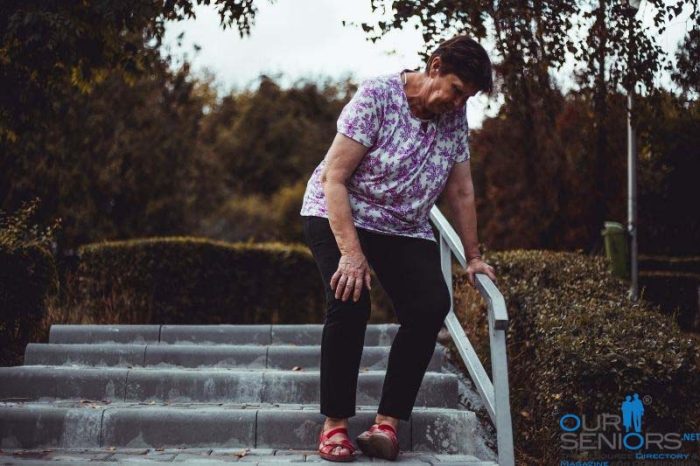All seniors should make keeping their personal mobility a top priority and that means taking steps today to “stay on your feet” in the future. It is not news to seniors that falls are a major concern. Most of us know someone who has lost their balance, taken a fall and started a painful, costly, even a fatal chain of events. This may involve a broken bone, hospitalization, a long rehab period and exposure to the dangers of being bedridden or hospitalized.
Let’s not dwell on the stories and statistics we have heard many times; falls are a big problem, that’s a given. Instead, let’s think about planning ahead to avoid the problem or to deal with it effectively when it does occur. While some medical conditions increase the danger of falling for all ages, falls should not be a normal part of growing older. Taking care of your overall health may be the most important factor in fall prevention. Most falls don’t just happen—they result from situations that could have been avoided.
Two of the most common such situations are the gradual loss of muscle strength and a declining sense of balance. With age, everyday activities like standing up from a chair and walking may become more difficult or cause a person to feel unsteady. Exercises that focus on balance and strength can significantly reduce the risk of falling, and these activities do not require any special equipment. A number of reliable sources can offer instruction and advice about this (see the Johns Hopkins Medicine.org or the CDC’s Stay Independant/Fall Prevention sites for example). Of course, sound advice will always remind you to talk to your doctor or physical therapist before starting new exercises. This is especially important if you have had balance issues in the past. After that talk, all you need is a sturdy chair and the will to repeat these exercises each day.
A second set of avoidable circumstances is improper use of some medications, especially when multiple drugs are involved. Make sure that your primary care doctor is aware of all the medicines you take, both prescription and non-prescription. Overuse of some drugs or improper combinations are common causes of dizziness and falls in seniors.
Changes in vision or inner ear function are conditions that can often be corrected by medical intervention. While these problems often occur in seniors, good medical treatment can prevent them from contributing to a bad fall.
Issues with shoes, or with the feet themselves, should be addressed long before they lead to stumbling or falling. Home hazards like throw rugs, unsafe steps, or plain old clutter should be eliminated before they lead to falling accidents. Bathroom and toilet facilities are home issues that require careful, special attention. Often, this should be done by a knowledgeable professional. Most people should not try to install their own shower or bathtub grab bar or drill in tile walls for any reason.
Getting enough sleep and avoiding overuse of alcohol are obvious measures to reduce the incidence of falling accidents. Even the most athletic and healthy young person can stumble if they are not well rested or impaired by too much partying.
Of all these prevention measures, surely the most important is the maintenance of muscle strength and balance. If you lose the ability to rise on your own, stand and walk with balance, falling will become inevitable.
Unavoidably, some seniors are going to become fall prone despite good intentions and personal effort. This prospect is especially concerning for seniors who live alone, fearing that they will not be able to summon help in case of a mishap. In this case, modern technology can be a lifesaver for seniors. The market is already crowded with tech devices that reduce the dangers and consequences of falling.
Many people will recall the 1980’s TV tagline for the LifeCall company, “Help! I’ve fallen, and I can’t get up.” LifeCall went out of business in the 1990’s and this early technology has been completely eclipsed by today’s senior-oriented devices. These range from the modestly priced Lively Wearable2 Mobile Medical Alert Plus ($25.00) to much more sophisticated and expensive devices like the Fitbit Sense Advanced Smartwatch. These more advanced devices not only have basic functions like alert mechanisms in case of falls, they can monitor heart rate, blood oxygen levels and other vital signs. They are truly little miracles—extremely useful for senior users.
This little device is amazing, but it cannot replace the sound advice given above—the best way to avoid the consequences of falling is to maintain good overall health and concentrate on strength and balance before problems begin. Keep moving, whether you are wearing a Fitbit or not!

